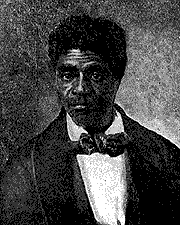| Slavery
Although President Jefferson valued the Indians as human beings, he and other Virginians looked upon African-Americans—primarily slaves—as less than human. Blacks were not noble savages but merely animals incapable of becoming civilized citizens of the United States. Unlike the Indians, blacks would never assimilate into American culture.
Despite his disdain for African-Americans, Jefferson did claim to oppose slavery. The president profited greatly from the use of slaves, yet he said he wanted to someday see the institution abolished in the United States. Claiming that society was not yet ready for such a drastic change, Jefferson never attempted to initiate this action; he simply yearned to see future generations stop it.
Jefferson's opinions of slavery and of blacks were contradictory to say the least. A man who so highly valued human rights—who even ventured to question slavery—ultimately failed to recognize an entire race as "human."
As the United States began to expand westward, the concept of slavery was no longer just an issue for Thomas Jefferson. It now affected the growing young country with this critical question: Should newly acquired western lands be slave states or free states?
This issue first became a conflict for Americans when the United States gained possession of the Louisiana Territory in 1803. Because of prior French influence the inhabitants of the area were both familiar with and accustomed to slavery; however, when the territory itself was divided into Upper and Lower Louisiana, things began to change. Upper Louisiana fell under the control of the Indiana Territorial Government. It deemed slavery illegal. Lower Louisiana was under the leadership of the Mississippi Territory. Slavery was still permitted there.
 |
| Dred Scott’s case before the U.S. Supreme Court helped set the stage for the Civil War. Image © 2002 www.clipart.com. |
The slavery question arose again in 1819 when the Missouri Territory petitioned for statehood. This constant debate eventually reached its peak in the 1850s. With the South supporting slavery and the North opposing it, the Dred Scott case increased the tensions of these battling territories. It even precipitated war.
Dred Scott was a black slave who fought for his freedom before the Supreme Court. He had lived in a free state and free territory for almost nine years. After several trials the Supreme Court finally denied Scott his freedom. In what is perhaps the most infamous case in its history, the court decided that all people of African ancestry—slaves as well as those who were free—could never become citizens of the United States and, therefore, could not sue in federal court. In addition, the Supreme Court ruled that the Missouri Compromise of 1820 was unconstitutional: The government could not prohibit slavery in newly forming territories of the United States.
The Dred Scott decision evoked a powerful storm of emotions among the American people. The tension that had been building between North and South would come to an end only after the Civil War—a violent four-year battle that began in 1861. The institution of slavery was a central issue.
< back | next > | 


